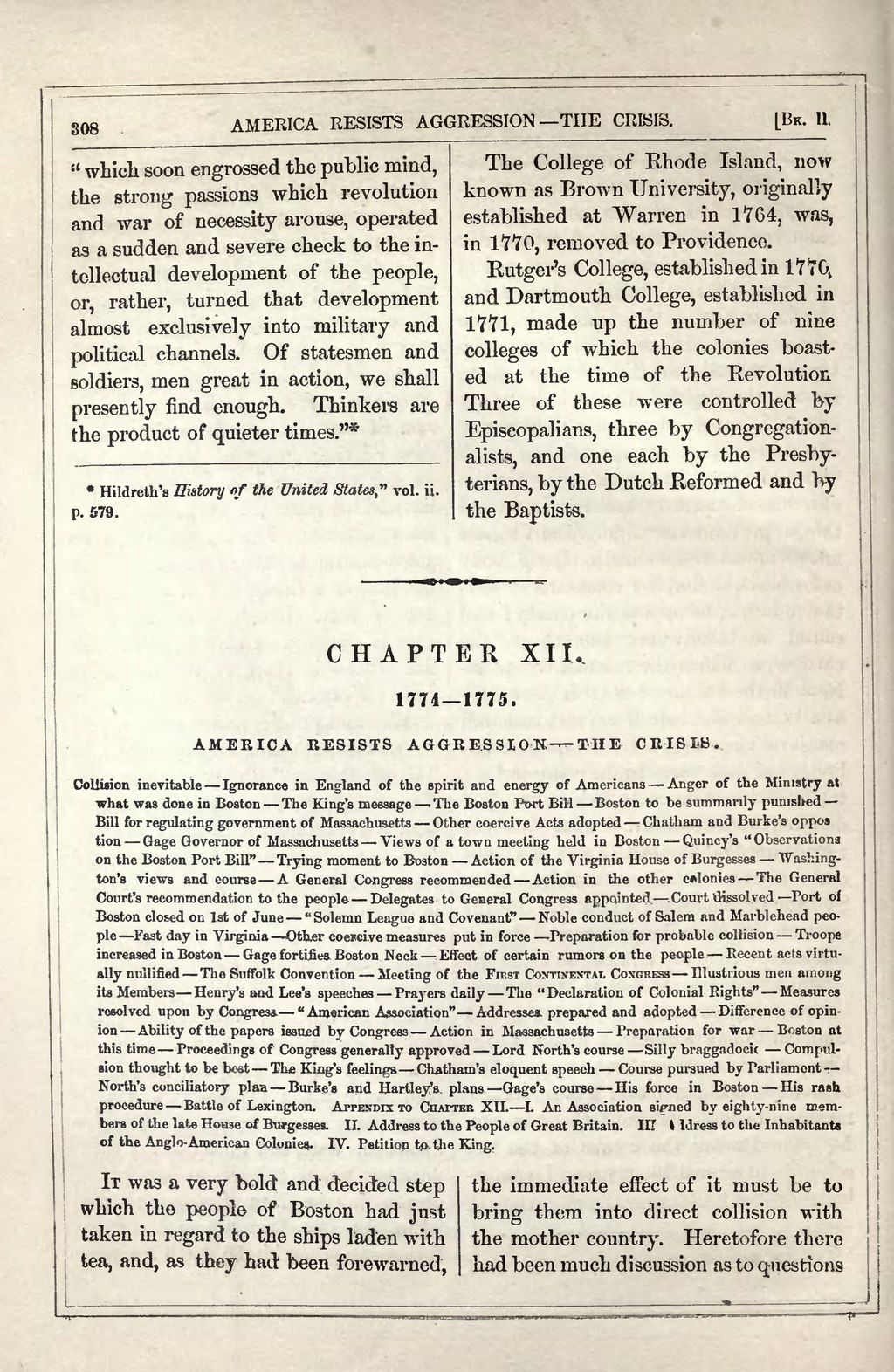"which soon engrossed the public mind, the strong passions which revolution and war of necessity arouse, operated as a sudden and severe check to the intellectual development of the people, or, rather, turned that development almost exclusively into military and political channels. Of statesmen and soldiers, men great in action, we shall presently find enough. Thinkers are the product of quieter times."[1]
The College of Rhode Island, now known as Brown University, originally established at Warren in 1764. was, in 1770, removed to Providence.
Rutger's College, established in 1776 and Dartmouth College, established in 1771, made up the number of nine colleges of which the colonies boasted at the time of the Revolution.Three of these were controlled by Episcopalians, three by Congregationalists, and one each by the Presbyterians, by the Dutch Reformed and by the Baptists.
| CHAPTER XII. |
1774—1775.
AMERICA RESISTS AGGRESSION—THE CRISIS.
Collision inevitable—Ignorance in England of the spirit and energy of Americans—Anger of the Ministry at what was done in Boston—The King's message—The Boston Port Bill—Boston to be summarily punished—Bill for regulating government of Massachusetts—Other coercive Acts adopted—Chatham and Burke's opposition—Gage Governor of Massachusetts—Views of a town meeting held in Boston—Quincy's "Observations on the Boston Port Bill"—Trying moment to Boston—Action of the Virginia House of Burgesses—Washington's views and course—A General Congress recommended—Action in the other colonies—The General Court's recommendation to the people—Delegates to General Congress appointed—Court dissolved—Port of Boston closed on 1st of June—"Solemn League and Covenant"—Noble conduct of Salem and Marblehead people—Fast day in Virginia—Other coercive measures put in force—Preparation for probable collision—Troops increased in Boston—Gage fortifies Boston Neck—Effect of certain rumors on the people—Recent acts virtually nullified—The Suffolk Convention—Meeting of theFirst Continental Congress—Illustrious men among its Members—Henry's and Lee's speeches—Prayers daily—The "Declaration of Colonial Rights"—Measures resolved upon by Congress—"American Association"—Addresses, prepared and adopted—Difference of opinion—Ability of the papers issued by Congress—Action in Massachusetts—Preparation for war—Boston at this time—Proceedings of Congress generally approved—Lord North's course—Silly braggadocic—Compulsion thought to be best—The King's feelings—Chatham's eloquent speech—Course pursued by Parliament—North's conciliatory plea—Burke's and Hartley's plans—Gage's course—His force in Boston—His rash procedure—Battle of Lexington. Appendix to Chapter XII..—I. An Association signed by eighty-nine members of the late House of Burgesses. II. Address to the People of Great Britain. III. Address to the Inhabitants of the Anglo-American Colonies. IV. Petition to the King.
It was a very bold and decided step which the people of Boston had just taken in regard to the ships laden with tea, and, as they had been forewarned, the immediate effect of it must be to bring them into direct collision with the mother country. Heretofore there had been much discussion as to questions
- ↑ Hildreth's "History of the United States," vol. ii. p. 579.
